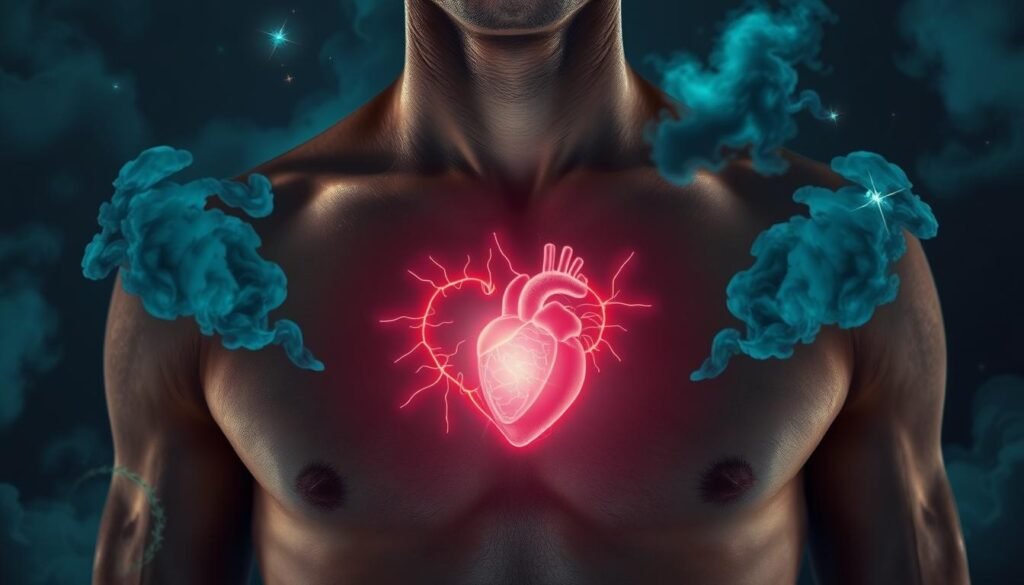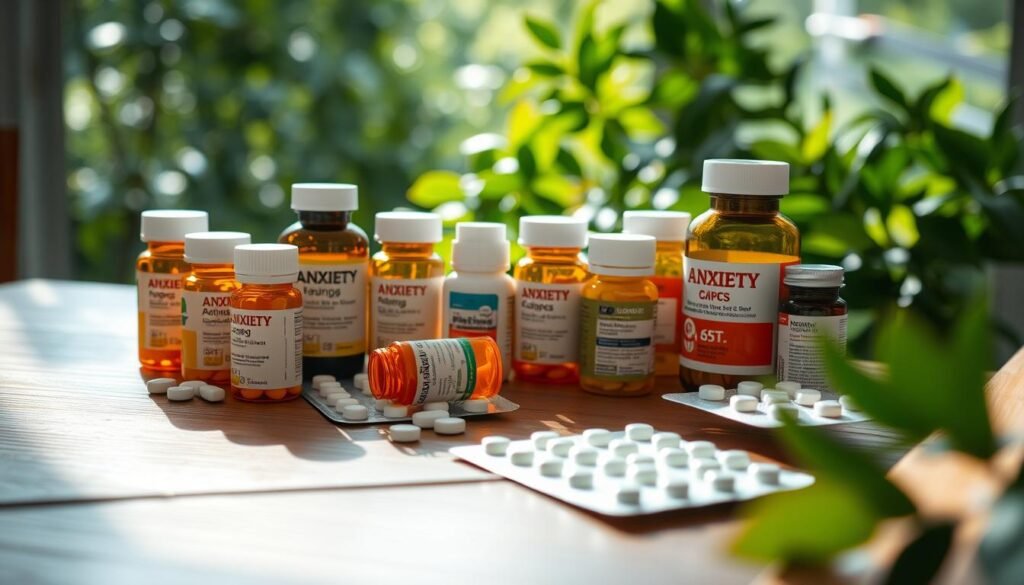An estimated 25 to 50 percent of patients at emergency rooms with low-risk chest pain feel moderate to severe anxiety. This fact highlights the link between anxiety and feelings of chest heaviness or discomfort. It’s crucial to understand this connection for your emotional and physical health. It helps determine when symptoms like chest pain from anxiety might point to a more serious issue.
Feeling a heavy chest from anxiety is worrying. It makes you wonder whether it’s a panic attack or a heart problem. In this article, we will discuss heavy chest feelings caused by anxiety. We’ll give insights to tell apart different causes, know when to get help, and how to cope. Knowing about this is the first step to manage anxiety. It allows you to look after your health better.
Key Takeaways
- Anxiety can show up as a heavy feeling in the chest.
- It’s important to know the difference between anxiety and heart issues.
- Many with chest pain from anxiety may not know it’s psychological.
- Getting medical help fast if you have chest pain is important.
- Good coping methods can greatly reduce chest discomfort due to anxiety.
- Being aware and educated about anxiety helps people take care of their health.
Understanding Anxiety and Its Symptoms
Anxiety is a mental health issue with signs like worry, nervousness, and fear. Each person experiences a range of anxiety symptoms that can be quite different. These can be ongoing worry, feeling tense, and feeling mentally uneasy. One common sign is the heavy feeling in chest anxiety. This issue can feel like other serious health problems.
During stressful times, many feel chest tightness anxiety, which feels like pressure. Recognizing these signs is key. It helps both the person affected and their loved ones understand what to do next. For those facing anxiety, knowing about it is the first step to control it. Anxiety comes in many forms, each unique in its way.
Generalized anxiety disorder involves constant worry, even about daily things. Social anxiety is fearing social judgment. Panic disorder causes sudden, intense fear attacks. Understanding these can help tell anxiety apart from other health issues.
From fear of open spaces to not speaking in some cases, anxiety varies widely. It’s shaped by experiences and genes. Those with a heavy feeling in chest anxiety should assess their feelings and seek advice if needed.
Getting to know anxiety can lead to better handling of its symptoms. Learning about treatments like drugs and therapy is crucial. Knowing how anxiety symptoms link to physical issues like chest pain can bring clarity. Anxious individuals can learn to manage their experiences better. For more details on anxiety, click here.
The Connection Between Anxiety and Chest Pain
Anxiety can greatly affect how we feel physically. It often shows up as chest pain from anxiety. This pain can feel like heart problems. This makes it hard for people to tell them apart. Studies show that anxiety or panic attacks cause nearly 58% of chest pain cases, not heart issues.
When we’re very anxious, our brain releases stress hormones such as adrenaline and cortisol. These make our heart beat faster and our blood pressure go up. This can make our chest feel tight and uncomfortable. This kind of chest pain usually happens in the center or left side. It’s different from heart attack pain, which can spread to shoulders and arms.
Chest muscle tension can make anxiety worse. People with anxiety might tighten their chest muscles without knowing. This makes the chest pressure feel stronger. The mix of mental and physical feelings can be too much. Knowing how anxiety and chest pain are related can help us feel better. It can guide us to good ways to cope.
If you want to know more about this, there are lots of resources. They talk about anxiety and how it affects our bodies. For example, you can find out more by exploring the connection between anxiety and chest pain. Understanding these symptoms can help us handle them better.
Heavy Feeling in Chest Anxiety: Causes and Effects
Many people with anxiety feel a heavy sensation in their chest. This can stem from their emotional state. Symptoms like tightness in the chest may seem scary. They might even feel like a heart attack. But it’s important to know these are often signs of anxiety, not always a serious health issue.
Anxiety Disorders and Physical Symptoms
Anxiety doesn’t just affect the mind; it can cause physical symptoms too. It shows how our minds and bodies are connected. People with anxiety might feel their chest tighten, especially when stressed. They might also experience heart palpitations, feeling as if the heart is racing. Breathing can become difficult, making it hard to catch a breath.
These symptoms can increase fear and panic. This makes the chest discomfort feel worse. Knowing these signs are from anxiety is the first step to managing them. This understanding can provide relief.
How the Body Reacts to Anxiety
The body’s response to anxiety is the fight-or-flight reaction. This causes several changes when anxiety levels rise. The heart rate may increase, causing palpitations. Muscles can tense up, leading to that tight feeling in the chest.
Rapid breathing might occur, making it feel hard to breathe. These reactions often mimic chest pain. Recognizing this as a response to anxiety can help. Learning to relax can lessen these symptoms. It helps in gaining control over both emotional and physical health.
Recognizing Anxiety Chest Pain vs. Heart Attack Chest Pain
Knowing the difference between chest pain from anxiety and a heart attack is very important. Both can feel similar and cause worry. It’s key to understand these differences to get help when it’s truly needed.
Common Symptoms of Anxiety Chest Pain
Anxiety chest pain is usually sharp and happens during stress. It includes:
- Feeling of tightness in the chest
- Persistent aching that usually goes away
- Occasional feelings of pressure
This kind of chest pain comes and goes, lasting a few minutes to an hour. Knowing it’s short-lived helps tell it apart from more serious problems.
Signs to Differentiate Between Panic Attacks and Heart Attacks
Panic attacks come on fast, triggered by stress. They include:
- Shortness of breath
- Heart rate that can go over 200 beats a minute
- Feeling like something awful will happen
On the other hand, heart attack signs are:
- Chest pain that feels like pressure
- Pain that moves to the jaw, back, or arms
- Other issues like nausea, sweating, and lasting tightness
Heart attack symptoms don’t go away and get worse, needing quick medical help. Doctors may find it hard to tell panic and heart attacks apart without checking the heart right away.

Coping Strategies for Heavy Feeling in Chest Anxiety
Feeling heavy in the chest because of anxiety is tough. People with anxiety breathing issues need good ways to cope. Breathing methods offer quick relief, and being mindful helps with long-term peace and stability.
Breathing Techniques to Alleviate Anxiety Symptoms
Breathing techniques are key for relaxation and easing anxiety. Here are some methods to try:
- Deep Breathing: Take a deep breath in through the nose, let your diaphragm expand, then breathe out slowly through the mouth. It helps slow your heart rate and calm panic.
- Box Breathing: Breathe in for four counts, hold for four, breathe out for four, and pause for four. This helps with focus and reduces anxiety symptoms.
- Pursed Lip Breathing: Inhale through the nose for two counts, then exhale slowly through pursed lips. This helps you control your breathing and lessens anxiety.
Mindfulness and Relaxation Practices
Adding mindfulness to your day can greatly help with anxiety. Doing things like meditating, yoga, and journaling builds clarity and strength. It teaches you to live in the moment, fighting off anxiety and distraction. These methods are very helpful for people with anxiety.
Getting help from support networks and resources also improves how you manage anxiety. It helps your overall health too.
Seeking Professional Help for Anxiety Disorders
Many people with anxiety find hope in different therapies. Getting help is key to overcoming anxiety effectively. Anxiety shows up in many ways. So, it’s important to find the right kind of therapy that fits one’s personal experience and symptoms.
Therapy and Counseling Options
Some therapies are especially good for dealing with anxiety:
- Cognitive Behavioral Therapy (CBT): Changes negative thoughts and actions to help manage anxiety better.
- Exposure Therapy: This method helps people face their fears slowly, in a safe space. It helps them become braver and less avoidant.
- Mindfulness-Based Stress Reduction (MBSR): Focuses on being aware of the present moment to ease anxiety symptoms.
- Dialectical Behavior Therapy (DBT): Great for those with strong emotional reactions, combining cognitive-behavioral and mindfulness techniques.
Working with a trained therapist can change lives. Many see big improvements after just a few meetings. They feel more in control of their anxiety. A mix of therapy methods can help knock down the barriers anxiety puts in everyday life.

Anxiety is one of the most treatable mental health problems. Catching it early and finding the right treatment can lead to better results. Recognizing the need for help and acting on it is crucial.
| Therapy Type | Focus | Duration |
|---|---|---|
| Cognitive Behavioral Therapy (CBT) | Thought restructuring and behavior modification | 5-10 sessions |
| Exposure Therapy | Confronting fears | Varied, often 8-12 sessions |
| Mindfulness-Based Stress Reduction (MBSR) | Mindfulness and stress management | 8-week program |
| Dialectical Behavior Therapy (DBT) | Emotional regulation and interpersonal effectiveness | Several months |
Choosing one or more therapy techniques can help people manage anxiety. It leads to a happier and healthier life.
Overcoming Chest Tightness and Discomfort
Anxiety can show up in physical ways. That’s why it’s important to handle it through lifestyle changes. By making some key changes, you can ease symptoms like chest tightness. This supports your mental health and wellness.
Lifestyle Changes to Manage Anxiety
Changing your lifestyle can boost both your mood and body health. Here are some tips:
- Maintain a balanced diet: Eat foods full of vitamins and minerals.
- Ensure adequate sleep: Getting seven to nine hours of sleep every night is crucial for your mental health.
- Engage in relaxation activities: Try meditation, deep breathing, or yoga to calm your mind.
- Avoid stimulants: Cut down on caffeine and nicotine as they can make anxiety worse.
These habits lead to a healthier way of living, making it easier to deal with anxiety. For more help with panic and anxiety, check out this guide.
Importance of Regular Exercise
Exercise is a strong ally against anxiety. It releases endorphins, which boost your mood and lessen tension. Here’s how you can fit exercise into your day:
- Find enjoyable activities: Pick fun exercises like dancing, jogging, or fitness classes.
- Start small: Begin with short exercise periods and slowly increase the challenge.
- Schedule workouts: Make exercise a regular part of your day to stay on track.
Exercise doesn’t just help with anxiety; it also improves your physical health. Simple daily activities can make a big difference in how you feel. Moving more is key to a happier, more stable life.
Medications for Managing Anxiety Symptoms
Many people struggle with anxiety disorders. To ease symptoms, doctors often prescribe various medications. This includes SSRIs and SNRIs, which help regulate mood and reduce symptoms like chest discomfort.
Understanding SSRIs and SNRIs
SSRIs are the go-to for treating generalized anxiety. Examples include Citalopram and Sertraline. They start working within 2–6 weeks. You should use them for 6–12 months. SNRIs are similar but also increase norepinephrine in the brain. This helps manage anxiety too.
Other Prescription Options
Benzodiazepines and beta-blockers are also used for anxiety. Drugs like Alprazolam relieve acute symptoms but can be addictive. Other options include antihistamines and antiseizure medications. Propranolol, a beta-blocker, helps with fear of public speaking or PTSD.
| Medication Type | Examples | Primary Use | Notes |
|---|---|---|---|
| SSRIs | Citalopram, Escitalopram, Fluoxetine, Paroxetine, Sertraline | Generalized anxiety disorder | First-line treatment; effects in 2–6 weeks |
| SNRIs | Duloxetine, Venlafaxine | Anxiety and depressive disorders | Similar action to SSRIs; may take several weeks to be effective |
| Benzodiazepines | Alprazolam, Clonazepam, Diazepam | Acute anxiety relief | Effective for short-term use; risk of dependence |
| Beta-blockers | Propranolol | Performance anxiety and stress management | Helps with specific situations, such as stage fright |
| Antihistamines | Hydroxyzine | Short-term anxiety management | Non-addictive option |
| Antiseizure Medications | Gabapentin, Pregabalin | Managing anxiety symptoms | Originally for seizure control but useful for anxiety |

Talking openly with doctors is key to finding the right anxiety meds. What works best can vary greatly between individuals. This depends on personal experiences and medical history.
When to Seek Emergency Medical Attention
Knowing when to get emergency help is very important. This is true if you feel new or odd chest pain. Around 40 million people in the U.S. have anxiety disorders. These disorders can make you feel chest pain. It’s important to know if your pain is from anxiety or maybe a heart problem.
If chest pain lasts a few minutes to several hours, it might be anxiety. Panic attacks usually last about 10 minutes. But, some symptoms mean you need help fast. If you have trouble breathing and chest pain, it could be serious. It might even be a heart attack. Other serious symptoms include:
- Having a hard time breathing
- Feeling confused
- Sweating a lot
- Feeling sick
- Pain going to your back, jaw, or left arm
- Feeling a lot of pressure
- Your heart beating fast
If you see signs of a heart attack, you should call 911. When they get there, doctors might do tests like an ECG. This helps them figure out why you have chest pain. Getting help quickly is key in the emergency room.
Anxiety can cause mild chest pain, but heart attack signs are different. Heart pain can feel sharp, dull, or like squeezing. Anxiety pain might feel tight. It’s important to act fast if you have chest pain. It could be from many things like muscle strain, pneumonia, GERD, or anxiety.
About 7.6 million people go to the emergency room for chest pain every year in the U.S. Doctors, like triage nurses, will ask about your symptoms. They want to know when it started and how it’s been changing. They might also ask if you feel dizzy. They could do tests like chest X-rays, blood work, and echocardiograms to find out why.
It’s important to get emergency care for chest pain, especially if it might be a heart attack. They might give you medicine right away, like aspirin or blood thinners. If needed, they may do more tests or treatments. After you’re stable, you should see your regular doctor. They will help you figure out why you had chest pain. This can help you avoid future problems.
Conclusion
This article looked at how anxiety is connected to feeling a heavy chest. Sometimes this feeling is confused with heart problems. But it’s often just anxiety and not something serious.
This kind of chest tightness is usually not dangerous. It often goes away in less than 10 minutes. But it’s important to know these signs. This knowledge helps in managing anxiety better.
Many times, chest pain isn’t about the heart but anxiety, affecting up to half of the cases. It’s key that we all take care of our mental health. Simple actions like deep breathing and regular exercise can ease chest tightness.
There are also professional treatments for those who need them. It’s a good idea to reach out for help when needed.
Learning more about anxiety and its signs helps us take better care of ourselves. For more details on how anxiety causes chest tightness, you can read more here. Taking action to understand and deal with anxiety is crucial for our health.